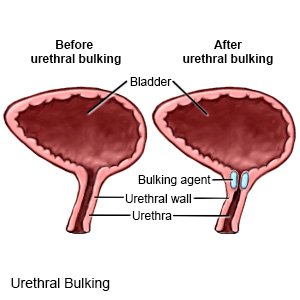Urethral Bulking
Medically reviewed by Drugs.com. Last updated on Aug 4, 2025.
Urethral bulking is used to help control stress incontinence in women. A silicone material is injected into 3 areas of your urethra to bulk up the tissue (make it thicker). This helps narrow your urethra to make it more difficult for urine to leak out. The material will stay in place permanently.
 |
DISCHARGE INSTRUCTIONS:
Seek care immediately if:
- You are urinating very little or not at all.
- You have a high fever with shaking chills.
- You have side or back pain that gets worse.
Call your doctor or urologist if:
- You have a fever.
- You see blood in your urine.
- You have pain or burning when you urinate.
- Your mouth feels dry or you have vision changes.
- Your urine is cloudy or smells bad.
- You have questions or concerns about your condition or care.
Related medications
Medicines:
You may need any of the following:
- Antibiotics help prevent or treat a bacterial infection.
- Acetaminophen decreases pain and fever. It is available without a doctor's order. Ask how much to take and how often to take it. Follow directions. Read the labels of all other medicines you are using to see if they also contain acetaminophen, or ask your doctor or pharmacist. Acetaminophen can cause liver damage if not taken correctly.
- NSAIDs help decrease swelling and pain or fever. This medicine is available with or without a doctor's order. NSAIDs can cause stomach bleeding or kidney problems in certain people. If you take blood thinner medicine, always ask your healthcare provider if NSAIDs are safe for you. Always read the medicine label and follow directions.
- Take your medicine as directed. Contact your healthcare provider if you think your medicine is not helping or if you have side effects. Tell your provider if you are allergic to any medicine. Keep a list of the medicines, vitamins, and herbs you take. Include the amounts, and when and why you take them. Bring the list or the pill bottles to follow-up visits. Carry your medicine list with you in case of an emergency.
Manage stress incontinence:
- Do pelvic muscle exercises often. Your pelvic muscles help you stop leaking urine. Squeeze these muscles tight for 5 seconds, then relax for 5 seconds. Gradually work up to squeezing for 10 seconds. Do 3 sets of 15 repetitions a day, or as directed. This will help strengthen your pelvic muscles and improve bladder control.
- Keep a symptom record. Write down how often you leak urine and how much you leak. Make a note of what you were doing when you leaked urine.
- Train your bladder. Go to the bathroom at set times, such as every 2 hours, even if you do not feel the urge to go. You can also try to hold your urine when you feel the urge to go. For example, hold your urine for 5 minutes when you feel the urge to go. As that becomes easier, hold your urine for 10 minutes.
- Drink liquids as directed. Ask your healthcare provider how much liquid to drink each day and which liquids are best for you. You may need to limit the amount of liquid you drink to help control your urine leakage. Do not drink any liquid right before you go to bed. Limit or do not have drinks that contain caffeine or alcohol.
- Prevent constipation. Eat a variety of high-fiber foods. Good examples are high-fiber cereals, beans, vegetables, and whole-grain breads. Prune juice may help make your bowel movement softer. Walking is the best way to trigger your intestines to have a bowel movement.

- Reach or maintain a healthy weight. Ask your healthcare provider what a healthy weight is for you. Your provider can help you create a safe weight loss plan, if needed. Your provider can also help you create a physical activity plan. A healthy weight and physical activity help decrease pressure on your bladder.
Follow up with your doctor or urologist as directed:
Write down your questions so you remember to ask them during your visits.
© Copyright Merative 2025 Information is for End User's use only and may not be sold, redistributed or otherwise used for commercial purposes.
The above information is an educational aid only. It is not intended as medical advice for individual conditions or treatments. Talk to your doctor, nurse or pharmacist before following any medical regimen to see if it is safe and effective for you.
Further information
Always consult your healthcare provider to ensure the information displayed on this page applies to your personal circumstances.
